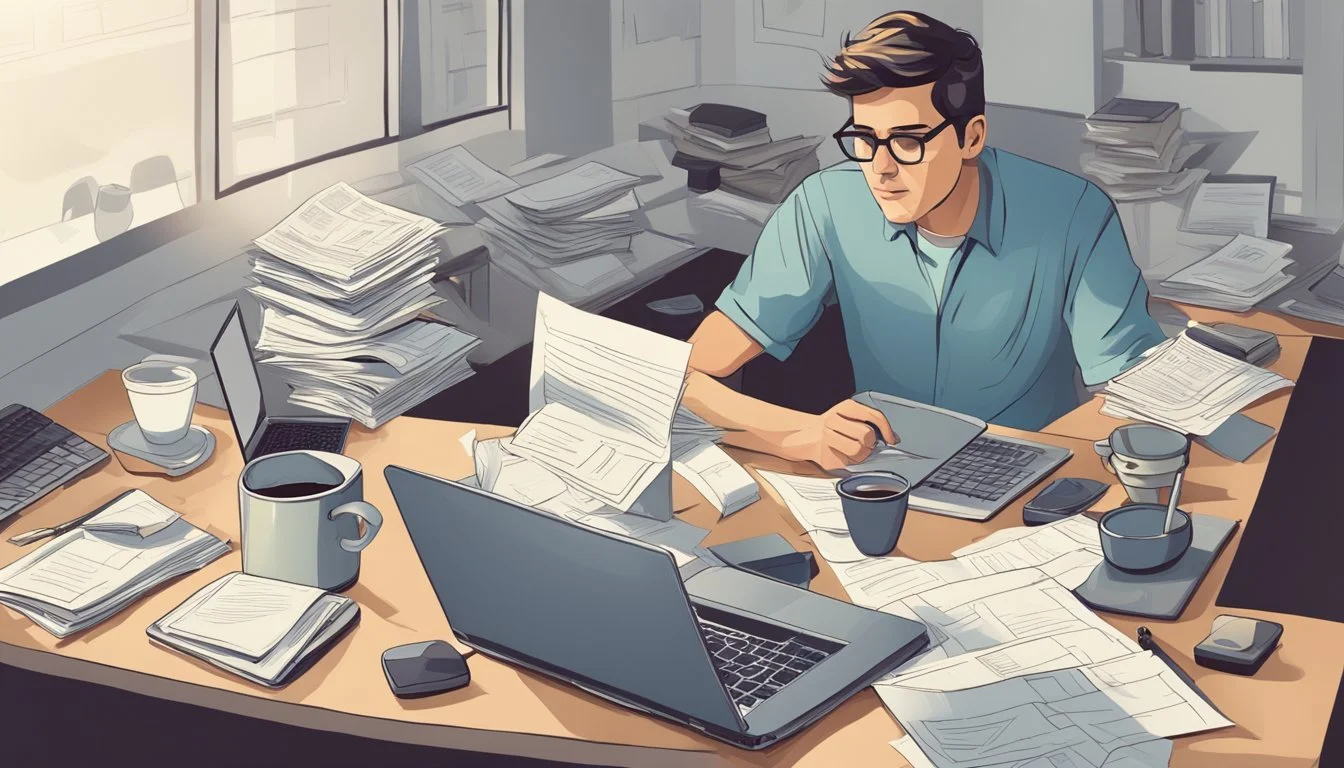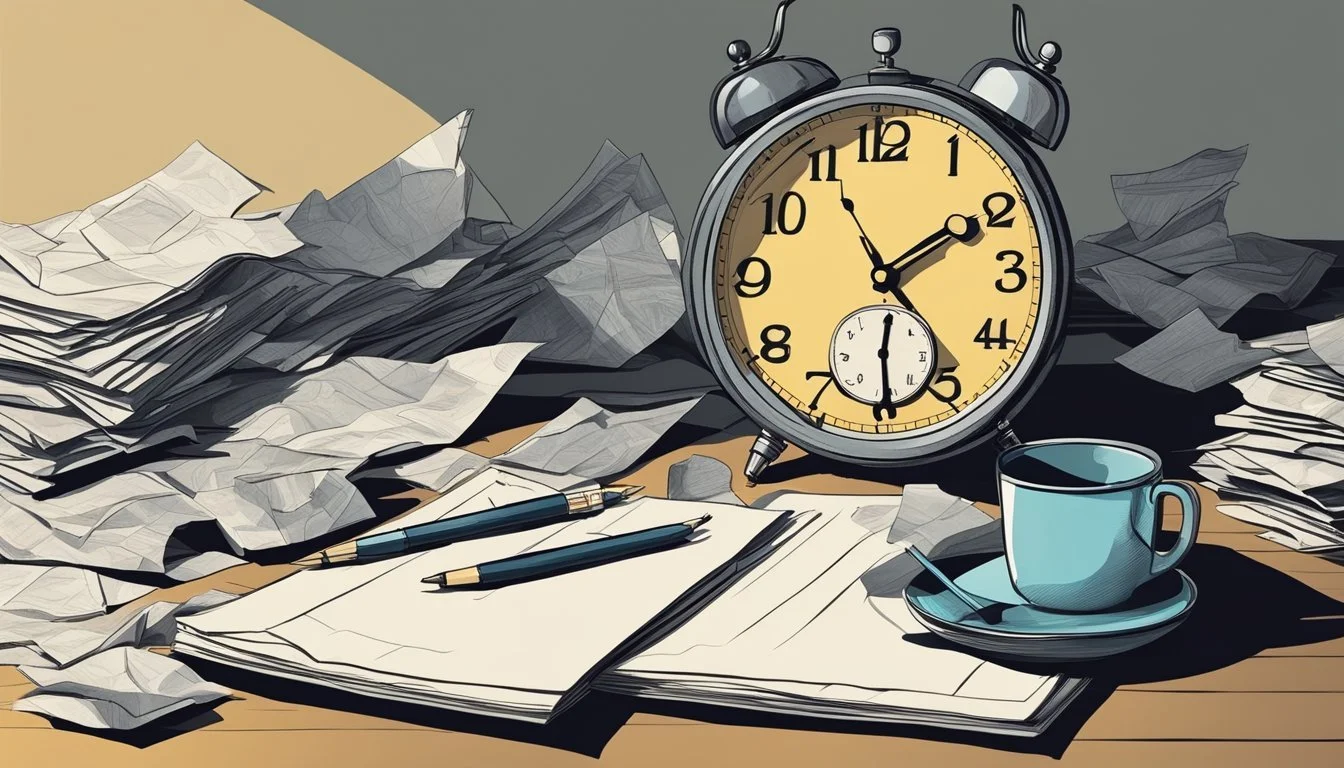Identifying and Preventing Surprising Anxiety Triggers
Anxiety can strike unexpectedly, triggered by seemingly innocuous situations or events. While some common anxiety triggers are well-known, others may catch people off guard, disrupting their daily lives and emotional well-being. Recognizing these unexpected triggers is crucial for developing effective coping strategies and maintaining mental health.
Understanding the diverse range of anxiety triggers empowers individuals to take proactive steps in managing their anxiety. By identifying and addressing these hidden sources of stress, people can work towards creating a more balanced and anxiety-resistant lifestyle. This article explores ten surprising anxiety triggers and provides practical tips for avoiding or mitigating their impact.
1) Caffeine Overload
Caffeine is a common stimulant found in coffee, tea, energy drinks, and some medications. While it can provide a temporary boost in energy and alertness, excessive consumption may trigger anxiety symptoms in some individuals.
Caffeine can increase heart rate, blood pressure, and cortisol levels, potentially mimicking or exacerbating feelings of anxiety. Those sensitive to its effects may experience jitters, restlessness, or difficulty concentrating after consuming caffeinated beverages.
To avoid caffeine-induced anxiety, consider
2) Social Media Scrolling
Social media scrolling can be a significant trigger for anxiety. The constant stream of information and comparison to others' curated lives often leads to feelings of inadequacy and stress.
The unpredictable nature of social media content creates a variable reward system. This keeps users engaged, much like a slot machine, as they search for the next dopamine hit from an interesting post.
Many people start and end their day scrolling through social media feeds. This habit can increase anxiety levels, especially when exposed to negative news or controversial topics.
Excessive social media use can also lead to FOMO (fear of missing out). Users may feel compelled to constantly check their devices, worrying about missing important updates or events.
To reduce anxiety from social media scrolling, users can set time limits for app usage. Turning off notifications and designating specific times for checking social media can help create healthier boundaries.
Curating one's feed by unfollowing accounts that trigger negative emotions can also improve the social media experience. Focusing on positive, uplifting content may help reduce anxiety associated with scrolling.
3) Financial Stress
Financial stress can be a significant trigger for anxiety. Money worries can lead to persistent feelings of unease and worry about paying bills, managing debt, or planning for the future.
Common symptoms of financial stress include difficulty sleeping, irritability, and physical tension. Some people may experience racing thoughts about expenses or fear unexpected costs.
To avoid financial stress, creating a budget is essential. Tracking income and expenses helps provide a clear picture of one's financial situation and enables better decision-making.
Building an emergency fund can alleviate anxiety about unexpected expenses. Aim to save enough to cover 3-6 months of living expenses.
Seeking professional financial advice can also be beneficial. A financial advisor can help develop strategies for managing debt, saving, and investing.
Regular exercise and relaxation techniques can help manage the physical symptoms of financial stress. Even short bursts of activity can boost mood and reduce anxiety.
Practicing self-compassion is important when dealing with money worries. Remember that financial challenges are common and do not define a person's worth.
4) Sleep Deprivation
Sleep deprivation can be a significant trigger for anxiety. Lack of adequate rest affects the brain's ability to regulate emotions and process stress effectively.
Studies have shown a bidirectional relationship between sleep problems and anxiety disorders. Poor sleep can exacerbate anxiety symptoms, while anxiety can make it difficult to fall asleep or stay asleep.
Chronic sleep deprivation alters the brain's emotional processing centers. This alteration can increase susceptibility to negative emotions and reduce resilience to stress.
Insufficient sleep is linked to increased activity in the amygdala, the part of the brain responsible for processing fear and anxiety. This heightened activity can lead to an overreaction to potential threats.
To mitigate the anxiety-inducing effects of sleep deprivation, it's crucial to prioritize good sleep hygiene. Establishing a consistent sleep schedule, creating a relaxing bedtime routine, and ensuring a comfortable sleep environment can help.
Regular exercise, particularly moderate aerobic activity, can improve both sleep quality and anxiety symptoms. Engaging in physical activity during the day can promote better sleep at night.
5) Poor Diet Choices
Diet plays a crucial role in managing anxiety levels. Certain foods and drinks can trigger or exacerbate anxious feelings, making it important to be mindful of dietary choices.
Processed foods high in sugar and unhealthy fats are known to contribute to anxiety. These include candy, pastries, fried foods, and high-fat dairy products. Consuming these items can lead to rapid blood sugar fluctuations, potentially worsening anxiety symptoms.
Caffeine, found in coffee, tea, and energy drinks, is a common anxiety trigger. While it may provide a temporary energy boost, excessive caffeine consumption can increase heart rate and contribute to feelings of nervousness and restlessness.
Alcohol is another substance that can negatively impact anxiety levels. Although it may initially seem to provide relaxation, alcohol can disrupt sleep patterns and lead to increased anxiety over time.
Artificial sweeteners and refined cereals are also worth avoiding for those prone to anxiety. These products can cause blood sugar spikes and crashes, potentially exacerbating anxious feelings.
To better manage anxiety through diet, focus on consuming whole foods, lean proteins, fruits, vegetables, and healthy fats. These nutrient-rich options can help stabilize blood sugar levels and support overall mental well-being.
6) Procrastination
Procrastination can be both a trigger and symptom of anxiety. When faced with challenging tasks, individuals may delay action due to fear of failure or perfectionism.
This avoidance behavior often leads to increased stress as deadlines approach, creating a cycle of anxiety and further procrastination. The pressure to complete tasks at the last minute can exacerbate existing anxiety symptoms.
To combat anxiety-induced procrastination, breaking tasks into smaller, manageable steps can be helpful. Setting realistic goals and focusing on progress rather than perfection can reduce overwhelming feelings.
Implementing time management techniques, such as the Pomodoro method, can improve productivity and decrease anxiety. This involves working in focused bursts with short breaks in between.
Practicing self-compassion is crucial when addressing procrastination. Treating oneself with kindness and understanding, rather than harsh criticism, can help reduce the fear and anxiety that fuel procrastination.
Creating a structured environment and minimizing distractions can also aid in overcoming procrastination. Establishing a dedicated workspace and setting clear boundaries can improve focus and reduce anxiety-related avoidance behaviors.
7) Crowded Places
Crowded places can be a significant trigger for anxiety in many individuals. The hustle and bustle of packed environments can overwhelm the senses and induce feelings of unease.
Common crowded locations that may spark anxiety include shopping malls, busy streets, public transportation, and large events. These spaces often combine multiple anxiety-inducing factors such as noise, limited personal space, and difficulty finding exits.
For those prone to anxiety, crowded places may evoke a sense of claustrophobia or fear of being trapped. The perceived lack of control in these situations can heighten stress levels and trigger panic attacks in some cases.
To mitigate anxiety in crowded settings, individuals can employ several strategies. Deep breathing exercises can help regulate physiological responses to stress. Focusing on a specific object or landmark can provide a sense of stability.
Planning ahead by familiarizing oneself with the layout of a venue or identifying potential quiet areas can also alleviate anxiety. Gradually exposing oneself to crowded environments in small doses may help build tolerance over time.
For severe cases, seeking support from a mental health professional can provide personalized coping mechanisms and treatment options. With proper strategies and support, many people can learn to navigate crowded spaces more comfortably.
8) Negative News Exposure
Constant exposure to negative news can trigger anxiety in many individuals. The 24/7 news cycle and easy access to information through smartphones and social media make it challenging to escape distressing headlines.
Negative news often focuses on disasters, crimes, and global crises, which can lead to feelings of helplessness and fear. Studies have shown that excessive consumption of negative news can increase stress levels and contribute to anxiety disorders.
To mitigate the impact of negative news, consider limiting news consumption to specific times of day. Avoid checking news immediately before bed or first thing in the morning, as this can set a negative tone for sleep or the day ahead.
Choose reputable news sources and be mindful of sensationalized content. Seek out balanced reporting that provides context and solutions rather than just focusing on problems.
Engage in positive activities after consuming news, such as exercise or spending time with loved ones. This can help counteract the emotional effects of negative information.
Remember that while staying informed is important, it's equally crucial to protect mental health by maintaining a balanced media diet.
9) Sudden Loud Noises
Sudden loud noises can trigger anxiety in many individuals. These unexpected sounds activate the body's fight-or-flight response, causing a surge of stress hormones and heightened alertness.
Common triggers include car horns, alarms, fireworks, or thunderclaps. For some people, even moderate sounds like a door slamming or a dog barking can provoke anxiety symptoms.
Noise sensitivity may be more pronounced in those with existing anxiety disorders or past traumatic experiences. The brain becomes hyper-aware of potential threats, interpreting sudden sounds as danger signals.
Physical symptoms of noise-induced anxiety can include rapid heartbeat, sweating, and trembling. Emotional reactions often involve feelings of fear, irritability, or an overwhelming urge to escape the situation.
To manage this trigger, individuals can practice relaxation techniques like deep breathing when exposed to sudden noises. Carrying noise-canceling headphones or earplugs can provide a sense of control in unpredictable environments.
Gradual exposure therapy, under professional guidance, may help desensitize individuals to triggering sounds over time. Creating a calm home environment with minimal unexpected noises can also provide a safe haven for those with noise-related anxiety.
10) Perfectionism Pressure
Perfectionism can be a significant trigger for anxiety. The constant drive to achieve flawless results often leads to excessive stress and worry.
Perfectionists set unrealistically high standards for themselves and others. When these standards aren't met, it can result in feelings of failure and inadequacy.
The fear of making mistakes or being judged can paralyze decision-making and hinder productivity. This creates a cycle of procrastination and last-minute rushes, further fueling anxiety.
Perfectionism also affects relationships. The need for everything to be "just right" can strain interactions with family, friends, and colleagues.
To reduce perfectionism-induced anxiety, individuals can practice setting realistic goals and accepting that mistakes are part of the learning process. Cognitive-behavioral therapy techniques can help challenge perfectionistic thought patterns.
Developing self-compassion and focusing on progress rather than perfection can alleviate anxiety. It's important to recognize that perfection is unattainable and that good enough is often sufficient.
Learning to prioritize tasks and let go of less important details can help manage perfectionist tendencies. This approach allows for a more balanced and less anxiety-provoking lifestyle.
Understanding Anxiety
Anxiety is a common mental health condition characterized by persistent worry and fear. It can manifest through various physical and emotional symptoms, impacting daily life and well-being.
What is Anxiety?
Anxiety is the body's natural response to stress or perceived threats. It triggers a fight-or-flight reaction, preparing the body for potential danger. While occasional anxiety is normal, persistent or excessive anxiety can be disruptive.
Anxiety disorders involve intense, prolonged feelings of fear or worry that interfere with daily activities. These disorders can take different forms, including generalized anxiety disorder, panic disorder, and social anxiety disorder.
Anxiety often stems from a combination of genetic, environmental, and neurological factors. Traumatic experiences, chronic stress, or chemical imbalances in the brain can contribute to its development.
Common Symptoms
Anxiety manifests through various physical and psychological symptoms. Common physical signs include:
Rapid heartbeat
Sweating
Trembling
Shortness of breath
Muscle tension
Psychological symptoms may involve:
Excessive worry
Restlessness
Difficulty concentrating
Irritability
Sleep disturbances
Anxiety can also lead to avoidance behaviors, where individuals steer clear of situations that trigger their symptoms. This avoidance can reinforce anxiety and limit one's quality of life.
Recognizing these symptoms is crucial for early intervention and effective management of anxiety. If symptoms persist or significantly impact daily functioning, seeking professional help is recommended.
Unexpected Triggers
Anxiety can be triggered by seemingly innocuous factors in our environment and diet. Recognizing these hidden culprits is crucial for managing anxiety effectively.
Environmental Factors
Clutter and disorganization can increase stress levels and trigger anxiety. A messy space often leads to feelings of being overwhelmed and out of control. Bright or flickering lights may also spark anxiety in some individuals, especially those prone to migraines or sensory sensitivities.
Sudden changes in temperature or humidity can cause physical discomfort that may escalate into anxiety. Extreme weather events like thunderstorms or high winds can trigger anxiety in those with weather-related phobias.
Certain scents, while pleasant to some, can be anxiety-inducing for others. Strong perfumes, cleaning products, or industrial smells might provoke anxious feelings or even panic attacks in sensitive individuals.
Dietary Triggers
Caffeine, a common ingredient in coffee, tea, and energy drinks, can exacerbate anxiety symptoms. It increases heart rate and can mimic the physical sensations of anxiety, potentially triggering an attack.
Sugar and refined carbohydrates cause rapid spikes and drops in blood sugar levels. These fluctuations can lead to mood swings, irritability, and increased anxiety.
Alcohol, often used to relax, can actually worsen anxiety symptoms. It disrupts sleep patterns and alters brain chemistry, potentially leading to increased anxiety, especially during withdrawal.
Food additives and preservatives may trigger anxiety in some people. Artificial colors, flavors, and MSG have been linked to increased nervousness and anxiety in sensitive individuals.
Dehydration can cause symptoms that mimic anxiety, such as dizziness and rapid heartbeat. Ensuring proper hydration is essential for maintaining emotional balance and reducing anxiety.
Preventive Measures
Taking proactive steps can significantly reduce the impact of anxiety triggers. These measures focus on creating a balanced lifestyle and developing effective coping mechanisms.
Lifestyle Modifications
Regular exercise is crucial for managing anxiety. Aim for 30 minutes of moderate activity most days of the week. This can include brisk walking, swimming, or cycling.
Prioritize sleep hygiene. Establish a consistent sleep schedule and create a relaxing bedtime routine. Avoid screens at least an hour before bed.
Limit caffeine and alcohol intake. These substances can exacerbate anxiety symptoms. Opt for herbal teas or water instead.
Maintain a balanced diet rich in whole foods, fruits, vegetables, and lean proteins. Avoid processed foods and excessive sugar.
Mindfulness and Relaxation Techniques
Practice deep breathing exercises daily. Inhale slowly for 4 counts, hold for 4, then exhale for 4. Repeat for 5-10 minutes.
Try progressive muscle relaxation. Tense and relax each muscle group, starting from your toes and moving up to your head.
Incorporate meditation into your routine. Start with 5 minutes daily and gradually increase. Use guided apps if needed.
Engage in mindfulness activities like coloring, gardening, or cooking. These help focus your attention on the present moment.
Consider yoga or tai chi classes. These practices combine physical movement with mindfulness, promoting relaxation and stress reduction.








